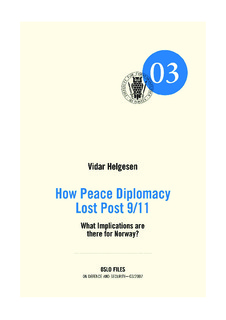| dc.description.abstract | Peace diplomacy has been a Norwegian foreign policy priority ever since the early successes of the Oslo channel in the Middle East. Though the nineties were a golden decade for peace diplomacy, the situation changed after 11 September 2001. Non-state parties to a number of internal conflicts have been labelled terrorist organizations, and the international community has tended to address such conflicts just as situations of one state fighting against terrorism. Instead, many internal, asymmetrical conflicts should be seen as cases of unfinished or incomplete state-building processes, and the international response should be one of supporting restructuring of the state to ensure all parts of society are included. This would require a willingness from governments to engage in asymmetrical diplomacy, implying negotiation with terrorists. International anti-terrorism measures have significantly constrained efforts to negotiate a peace. This has also had implications for Norway as its peace diplomacy has been caught between international anti-terrorism policies which it cannot influence, and peace diplomacy ambitions which it cannot live up to precisely because of the policies mentioned. This has led to the effectiveness and relevance of Norway’s peace diplomacy increasingly being called into question. In response, Norway should shape more comprehensive and less compartmentalized peace and security policies. | no_NO |
